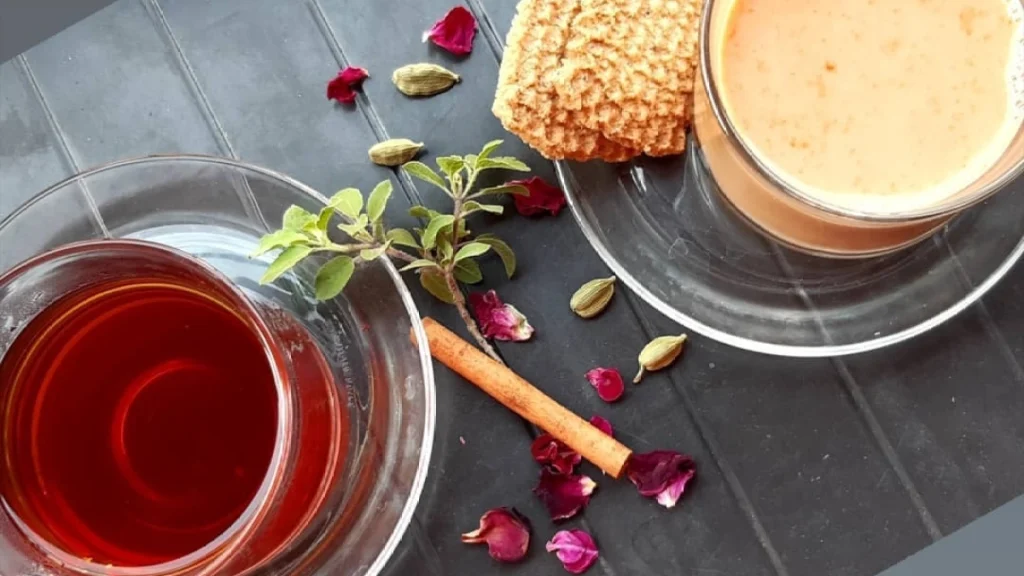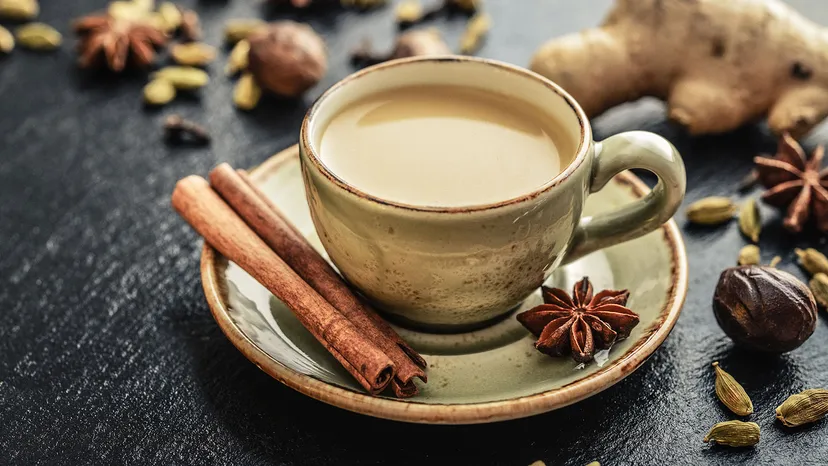On a chilly morning or a quiet afternoon, there’s nothing quite like wrapping your fingers around a warm cup of chai tea. This aromatic beverage, often infused with a blend of spices and black tea, has roots that reach deep into the history and culture of many parts of Asia, particularly India.
Chai has been cherished not only for its delightful taste but also for its supposed medicinal qualities. In the West, the popularity of chai has grown exponentially, and it’s now a staple in many coffee shops and homes.
But beyond its flavorful appeal, can chai tea offer genuine health benefits, particularly for ailments like a sore throat? It’s a question that many ask, especially during cold and flu season or whenever that familiar scratchy sensation starts to develop in the back of the throat.
Throughout this article, we’ll delve into the ingredients of chai tea, investigate their potential benefits for a sore throat, and offer insight into how this beloved beverage might just be the comforting remedy you’re searching for.
Is Chai Tea Good For Sore Throat?
Yes, chai tea can be beneficial for a sore throat for several reasons. However, while chai tea can offer relief, it’s essential to recognize that it’s a complementary remedy. If you have a persistent or severe sore throat, it’s crucial to consult with a healthcare professional. Also, individual responses can vary, and what works for one person might not work for another.
The reasons why Chai Tea is good for sore throats is because of the Ingredients which have many benefits for a sore throat. They include:
1. Black Tea
At the heart of every chai is its base: black tea. Made from the fermented leaves of the Camellia sinensis plant, black tea is a popular beverage worldwide.
Black tea contains antioxidants, specifically polyphenols, that might bolster overall health. Tannins, a type of polyphenol found in black tea, possess potential anti-inflammatory properties, which can be soothing for an irritated throat.
Recommended: Cold And Flu: Natural Ways To Reduce Their Symptoms
2. Ginger
Recognizable for its knobby appearance and spicy flavor, ginger has been used for centuries in various traditional medicines.
Ginger contains gingerol, a bioactive compound known for its anti-inflammatory and antioxidative properties. Its warming and spicy nature can produce a soothing effect on the throat, potentially reducing swelling and pain.
3. Cinnamon
Derived from the bark of trees from the genus Cinnamomum, cinnamon adds a sweet, woody aroma and flavor to chai tea.
Cinnamon has natural compounds that can act as analgesics, helping to relieve pain. Additionally, it has antimicrobial properties that may help combat pathogens that cause throat infections.
4. Cardamom
These small green pods impart a sweet, aromatic flavor to chai and many other dishes. Cardamom may have antimicrobial properties, assisting in the battle against bacteria or viruses that can cause sore throats. It also aids in clearing mucus, which can be particularly beneficial for those with a phlegmy cough accompanying their sore throat.
5. Cloves
These tiny, nail-shaped buds add a distinctive warm and slightly bitter flavor to chai tea. Cloves contain eugenol, a compound known for its anesthetic and antiseptic properties. This can help in numbing the throat and reducing pain and discomfort.
6. Black Pepper
While only used in small quantities, black pepper can give chai a mild spicy kick. Piperine, a compound in black pepper, has been linked to anti-inflammatory properties. This could assist in alleviating pain and inflammation in the throat.
7. Star Anise
This star-shaped spice offers a licorice-like flavor to the tea. Star anise contains shikimic acid, an ingredient known to be used in the production of some antiviral drugs. While it doesn’t mean drinking chai is equivalent to taking antiviral medication, it’s an interesting component to note.
8. Milk & Honey (optional additions)
Many enjoy their chai with a splash of milk and a spoonful of honey, not only for taste but for added benefits. Honey is renowned for its natural soothing and antibacterial properties. A warm chai with honey can offer immediate relief for a scratchy throat. Milk’s creaminess provides a smooth texture that can be comforting. However, some people find that dairy can thicken mucus, so it’s essential to be mindful of how one’s body reacts.
Recommended: Can Kidney Problems Cause Coughing?
Each ingredient in chai tea brings its unique flavor profile and potential health benefits. When combined, these elements create a symphony of taste and wellness that many find comforting when nursing a sore throat.

How Chai Tea Compares to Other Sore Throat Remedies
Chai Tea vs. Green Tea
Green tea, made from unoxidized leaves of the Camellia sinensis plant, is loaded with antioxidants and beneficial polyphenols.
While both teas contain antioxidants, green tea is typically richer in catechins, which are known for their anti-inflammatory and antiviral properties. However, chai tea brings in a combination of spices that individually offer numerous benefits, making it a more complex remedy than plain green tea.
Chai Tea vs. Warm Salt Water Gargle
Gargling with warm salt water is an age-old remedy for sore throats, believed to reduce swelling and kill bacteria in the throat.
Chai tea offers a more pleasurable experience with its rich flavors and warmth, while salt water is more of a direct approach to alleviating sore throat symptoms. The osmotic effect of salt may draw out some of the fluids causing swelling in the throat, providing quick relief. Chai tea, on the other hand, provides a gradual soothing effect due to its mix of spices and warmth.
Chai Tea vs. Over-the-Counter Solutions
Over-the-counter (OTC) sore throat remedies, like lozenges or sprays, often contain medicinal ingredients designed to numb the throat, reduce inflammation, or combat bacterial infections.
OTC solutions are formulated specifically to address the symptoms of a sore throat and may provide quicker, targeted relief. Chai tea serves as a natural remedy, offering more general benefits from its spices and warmth. While chai tea can be a comforting and soothing option, it may not be as potent as specialized OTC solutions. It’s essential to consider the severity of the sore throat when choosing a remedy.
Chai Tea vs. Herbal Teas (e.g., Chamomile, Peppermint)
Herbal teas like chamomile and peppermint are caffeine-free and have been lauded for their soothing and anti-inflammatory properties for centuries.
Chamomile tea, known for its calming effects, can help reduce inflammation and potentially provide better sleep. Peppermint tea, with its menthol content, can act as a natural decongestant. Chai tea offers a mix of benefits from its various ingredients, making it versatile but not as targeted in its effects as some herbal teas. Depending on the individual’s symptoms, an herbal tea might be more suitable for specific needs.
Recommended: How To Deal With Whooping Cough (Pertussis)
While chai tea is a delicious and comforting beverage with several potential benefits for a sore throat, its efficacy might differ from person to person and based on the severity of symptoms. It can be an excellent addition to one’s toolkit of remedies, but it’s crucial to choose the most appropriate solution based on individual needs.
How to Prepare Chai Tea for Maximum Benefits for a Sore Throat
1. Selecting Quality Ingredients
The quality of ingredients can significantly influence the potency and effectiveness of the chai:
- Opt for organic and fresh spices when possible.
- Choose a quality black tea; loose leaf often retains more of its original flavor and potency than tea bags.
2. Brewing Method
The way you prepare your chai can make a difference in extracting the maximum benefits from each ingredient:
- Start by boiling water.
- Crush or grind the spices slightly to release their essential oils and flavors more efficiently.
- Add the spices and black tea to the boiling water. Simmer for at least 10-15 minutes to ensure the water absorbs all the flavors and benefits. The longer you simmer, the stronger the tea.
- If adding milk, do so after simmering the tea and spices, and bring the mixture to a gentle boil again before turning off the heat.
3. Ratios for a Potent Sore Throat Remedy
While traditional chai tea ratios vary by personal preference and regional variations, here’s a ratio that aims to maximize the benefits for a sore throat:
- 2 cups of water
- 1-inch piece of ginger, sliced or grated
- 2-3 cinnamon sticks
- 3-4 cardamom pods, slightly crushed
- 3-4 cloves
- 1-star anise
- 1/2 teaspoon of black peppercorns
- 2 teaspoons of black tea (or 1-2 tea bags)
4. Adding Sweeteners and Enhancers
While traditional chai is often sweetened with sugar, for sore throats, certain natural sweeteners can enhance the healing properties:
- Honey: Known for its antibacterial and soothing properties, adding a spoonful of raw honey can amplify the sore throat soothing effects of your chai. Remember to add honey after removing the tea from the heat to preserve its properties.
- Lemon: A slice of lemon can add a touch of vitamin C and further soothe the throat. However, its acidity might not be suitable for everyone, especially if the sore throat is accompanied by acid reflux.
5. Drink While Warm, Not Hot
The temperature of the chai is essential when drinking for a sore throat. Ensure the chai is warm but not scalding hot. Drinking it too hot might aggravate the sore throat, while a warm beverage can offer maximum soothing potential.
6. Frequency and Quantity
Drinking chai can be beneficial, but like all remedies, moderation is key. For a sore throat, consider having 2-3 cups throughout the day. Remember that black tea contains caffeine, so it’s wise not to overconsume, especially closer to bedtime.
Recommended: About Green Tea & Its Amazing Health Benefits And Side Effects
By following these guidelines and focusing on the quality, preparation method, and the right ratios, one can optimize the potential benefits of chai tea for a sore throat. Whether you’re a chai connoisseur or a novice, preparing it with intention and care can amplify its therapeutic effects.

Considerations and Precautions When Using Chai Tea as a Sore Throat Remedy
1. Individual Ingredient Sensitivities
Everyone’s body is different, and what might be soothing for one person could be an irritant for another. Be mindful of any allergies or sensitivities to specific spices used in chai tea. If you’re unsure, introduce one ingredient at a time to monitor your body’s response.
2. Caffeine Content
Black tea, a primary ingredient in chai, contains caffeine. While caffeine can provide a welcome energy boost, especially when feeling under the weather, it’s essential to monitor intake. Excessive caffeine can lead to restlessness, insomnia, and exacerbate dehydration. If drinking chai in the evening, consider a decaffeinated black tea to avoid disrupting sleep.
3. Dairy and Mucus Production
Traditional chai often includes milk, which can be a point of contention when dealing with throat issues. Some people find that dairy products can exacerbate mucus production, making a phlegmy throat feel worse. If you suspect this might be the case for you, try preparing your chai without milk or use non-dairy alternatives like almond or oat milk.
4. Sugar and Inflammation
Sugar is often added to chai to enhance its flavor. High sugar consumption can contribute to inflammation in the body, potentially worsening a sore throat. Opt for natural sweeteners like honey, which not only sweetens the tea but also provides its own set of soothing properties.
5. Chronic or Severe Symptoms
While chai can offer relief for minor sore throats, it’s essential to recognize when professional medical attention is required.
If your sore throat is persistent, accompanied by high fever, difficulty swallowing, or any other severe symptoms, it’s crucial to consult a healthcare professional. Chai tea is a complementary remedy and should not replace professional medical advice or treatment.
6. Potential Interactions with Medications
Some spices in chai may interact with certain medications. For example, the blood-thinning properties of ginger could potentially amplify the effects of anticoagulant medications. Always consult with a healthcare professional if you’re on medication and are unsure about potential interactions.
7. Acid Reflux Consideration
Certain ingredients in chai might exacerbate symptoms in individuals with acid reflux or GERD. Spices like ginger and black pepper can sometimes irritate those with sensitive stomachs. If you suffer from acid reflux, be cautious and monitor how your body reacts to chai.
Recommended: 21 Best GERD Foods To Reduce Acid Reflux
While chai tea is a delicious and potentially beneficial remedy for sore throats, it’s vital to be aware of individual sensitivities and considerations. Always listen to your body and consult with health professionals when in doubt. Remember that natural remedies can complement but not replace professional medical advice.
Other Herbal Teas Beneficial for a Sore Throat
1. Peppermint Tea
Peppermint tea is made from the leaves of the peppermint plant and has a strong, refreshing flavor.
Benefits for Sore Throat:
- Menthol: Acts as a natural decongestant, helping to break down mucus.
- Anti-inflammatory properties: Can soothe the throat and reduce swelling.
- Natural muscle relaxant: Can help relieve a cough and soothe throat muscles.
2. Chamomile Tea
Made from the dried flowers of the chamomile plant, this tea has a gentle, floral taste and is caffeine-free.
Benefits for Sore Throat:
- Anti-inflammatory properties: Helps to reduce redness and swelling in the throat.
- Natural sedative effects: Can aid in better sleep, especially if a sore throat is disrupting your rest.
- Antioxidant-rich: May boost the immune system, assisting in faster recovery.
3. Slippery Elm Tea
Derived from the inner bark of the slippery elm tree, this tea has been used as a remedy for various ailments for centuries.
Benefits for Sore Throat:
- Mucilage: When mixed with water, slippery elm produces a gel-like substance called mucilage that can coat and soothe the throat.
- Anti-inflammatory properties: Can help reduce pain and swelling in the throat.
4. Licorice Root Tea
Made from the root of the licorice plant, this tea has a sweet, anise-like flavor.
Benefits for Sore Throat:
- Natural expectorant: Helps in clearing the respiratory system of mucus.
- Anti-inflammatory and antiviral properties: Can help soothe the throat and combat viruses causing throat infections.
5. Throat Coat Tea
This is a blend of different herbs, often including licorice root, marshmallow root, and elm bark. It’s specifically designed to support throat health.
Benefits for Sore Throat:
- Coating effect: Many of its ingredients are chosen for their soothing, mucilaginous properties that coat the throat.
- Blend of multiple herbs: Offers a combination of benefits, such as reducing inflammation, clearing mucus, and boosting immunity.
6. Elderberry Tea
Made from the berries and flowers of the elder tree, elderberry tea is often hailed for its immune-boosting properties.
Benefits for Sore Throat:
- Rich in antioxidants: Can support the immune system.
- Antiviral properties: May help combat viral infections that can cause a sore throat.
Incorporating herbal teas into your regimen can be a natural way to support throat health and provide relief from the discomfort of a sore throat. Each tea offers unique properties and benefits, so you might find that a particular tea or a combination of several teas works best for your specific needs.
Recommended: 9 Things About Kratom You Didn’t Know
As with any remedy, it’s essential to consult with a healthcare professional if you have underlying health conditions or are unsure about potential interactions with medications.
Conclusion
Chai tea, with its aromatic blend of spices and warmth, can serve as a natural remedy for soothing a sore throat. Its ingredients each offer unique therapeutic properties that collectively provide comfort. However, it’s essential to remember that while chai and other herbal teas can complement traditional treatments, they shouldn’t replace professional medical advice.
For those seeking a gentle and flavorful relief, chai could be a delightful choice. Always listen to your body, consider individual sensitivities, and consult with healthcare experts when needed to ensure optimal health and well-being.
